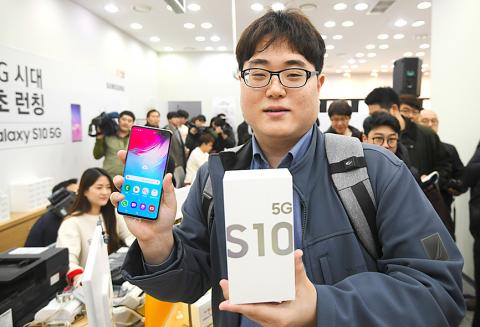The world’s biggest smartphone and memorychip maker Samsung Electronics Co yesterday warned of a more than 60 percent plunge in first-quarter operating profit in the face of weakening markets.
Operating profit for the first quarter would be “approximately 6.2 trillion won [US$5.45 billion],” the firm said in a statement, down 60.4 percent year-on-year.
Sales were about 52 trillion won, it said, marking a 14 percent drop.

Photo: AFP
The firm has enjoyed record profits in recent years, despite a series of setbacks, including a humiliating recall and the jailing of its de facto boss, but now the picture has changed, with chip prices falling as global supply increases and demand weakens.
The company’s earnings estimate was below analyst forecasts of 6.9 trillion won, according to Bloomberg News.
It would represent the firm’s lowest operating profit since the third quarter of 2016 and it comes after the firm reported its first fall in quarterly profit for two years in January.
Samsung shares yesterday closed down 0.2 percent in Seoul.
The company has to contend with increasingly tough competition in the smartphone market from Chinese rivals such as Huawei Technologies Co (華為) — which in 2017 surpassed Apple Inc to take second place — offering quality devices at lower prices.
Samsung supplies components to other manufacturers such as Apple as well as making its own devices, but market prices for LCDs have fallen 10 percent quarter-on-quarter, said Sanjeev Rana, an analyst at investment firm CLSA Ltd, while demand for smartphones in China — the world’s biggest market — has been weak.
Prices for NAND memory — used in smartphones and other devices — fell 20 percent in the first quarter, according to market tracker DRAMeXchange, which pointed the finger at consumers taking longer to replace their smartphones and lower-than-expected sales of Apple’s new devices.
DRAM chips, used in computer servers, fell by similar levels, it added.
Rana predicted a “slight” rebound in the second quarter.
“This quarter is the bottom in terms of earnings,” Rana said.
Samsung was yesterday launching the 5G version of its top-end Galaxy S10 smartphone — the first such device available anywhere — after South Korea this week won the global race to commercially launch the world’s first nationwide 5G networks.
South Korea’s three telecoms — SK Telecom, KT and LG Uplus — held launch events across Seoul for the Galaxy S10, whose base version costs 1.39 million won.
Before yesterday’s debut of the Samsung phone, 5G services had been restricted to a handful of specially selected users in South Korea.
Rival manufacturer LG Electronics Co is due to launch its V50 ThinQ, another 5G phone, later this month, while in the US, Verizon Communications Inc’s network works with Lenovo Group Ltd’s (聯想) Moto Z3 smartphone fitted with a special accessory.
Commercializing 5G gives South Korea the chance to build around the technology, which is crucial for the future development of devices such as autonomous vehicles and the Internet of Things.
It is expected to bring about US$565 billion in global economic benefits by 2034, according to the London-based Global System for Mobile Communications, an industry alliance.

‘SWASTICAR’: Tesla CEO Elon Musk’s close association with Donald Trump has prompted opponents to brand him a ‘Nazi’ and resulted in a dramatic drop in sales Demonstrators descended on Tesla Inc dealerships across the US, and in Europe and Canada on Saturday to protest company chief Elon Musk, who has amassed extraordinary power as a top adviser to US President Donald Trump. Waving signs with messages such as “Musk is stealing our money” and “Reclaim our country,” the protests largely took place peacefully following fiery episodes of vandalism on Tesla vehicles, dealerships and other facilities in recent weeks that US officials have denounced as terrorism. Hundreds rallied on Saturday outside the Tesla dealership in Manhattan. Some blasted Musk, the world’s richest man, while others demanded the shuttering of his

ADVERSARIES: The new list includes 11 entities in China and one in Taiwan, which is a local branch of Chinese cloud computing firm Inspur Group The US added dozens of entities to a trade blacklist on Tuesday, the US Department of Commerce said, in part to disrupt Beijing’s artificial intelligence (AI) and advanced computing capabilities. The action affects 80 entities from countries including China, the United Arab Emirates and Iran, with the commerce department citing their “activities contrary to US national security and foreign policy.” Those added to the “entity list” are restricted from obtaining US items and technologies without government authorization. “We will not allow adversaries to exploit American technology to bolster their own militaries and threaten American lives,” US Secretary of Commerce Howard Lutnick said. The entities

Minister of Finance Chuang Tsui-yun (莊翠雲) yesterday told lawmakers that she “would not speculate,” but a “response plan” has been prepared in case Taiwan is targeted by US President Donald Trump’s reciprocal tariffs, which are to be announced on Wednesday next week. The Trump administration, including US Secretary of the Treasury Scott Bessent, has said that much of the proposed reciprocal tariffs would focus on the 15 countries that have the highest trade surpluses with the US. Bessent has referred to those countries as the “dirty 15,” but has not named them. Last year, Taiwan’s US$73.9 billion trade surplus with the US

Prices of gasoline and diesel products at domestic gas stations are to fall NT$0.2 and NT$0.1 per liter respectively this week, even though international crude oil prices rose last week, CPC Corp, Taiwan (台灣中油) and Formosa Petrochemical Corp (台塑石化) said yesterday. International crude oil prices continued rising last week, as the US Energy Information Administration reported a larger-than-expected drop in US commercial crude oil inventories, CPC said in a statement. Based on the company’s floating oil price formula, the cost of crude oil rose 2.38 percent last week from a week earlier, it said. News that US President Donald Trump plans a “secondary